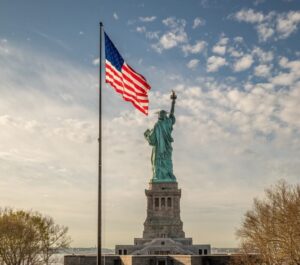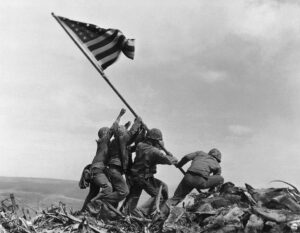The concept of freedom, as embodied by the United States of America, has shaped the course of global history, offering hope and a model for societies seeking liberty, democracy, and justice.
Since its inception, the United States has been a powerful symbol of self-governance and individual rights. Its revolutionary struggle for independence in 1776 and the subsequent crafting of its founding documents—the Declaration of Independence, the Constitution, and the Bill of Rights—marked a radical departure from the monarchies and oppressive regimes that dominated much of the world at the time.
The message was profound: a government’s legitimacy stems not from divine right or inherited power, but from the consent of the governed. This fundamental idea continues to resonate, not only within the borders of the United States but far beyond, influencing revolutions, independence movements, and democratic reforms across the globe. America’s example has led countless nations to aspire to greater freedom, often using the U.S. as a model for creating their own systems of governance.

The Birth of a Free Nation
When the Founding Fathers declared independence from Britain, they articulated a vision of freedom rooted in natural rights—rights that were “self-evident” and belonged to all people simply by virtue of their humanity. The Declaration of Independence, written primarily by Thomas Jefferson, declared that every individual has the right to life, liberty, and the pursuit of happiness. This was not merely a call for political independence but a universal declaration of human dignity.
The U.S. Constitution, adopted in 1787, provided the structure for a government built on these ideals. It enshrined the separation of powers, checks and balances, and a system of federalism that would allow individual states significant autonomy. The Bill of Rights, ratified in 1791, further solidified the promise of American freedom, guaranteeing fundamental liberties such as freedom of speech, religion, the press, assembly, and protection from arbitrary government interference. These principles became the bedrock of what is now recognized as modern democracy.

America as a Global Example
The American Revolution was not just a local event; it set in motion a wave of changes that would ripple across the world. By successfully overthrowing colonial rule and establishing a republic founded on democratic ideals, the United States provided a blueprint for others seeking to escape oppression. The notion that ordinary people could govern themselves, free from the tyranny of kings or empires, was revolutionary. This idea would soon find resonance in Europe, Latin America, Africa, and Asia.
One of the earliest and most profound examples of America’s influence was the French Revolution, which began in 1789. French intellectuals and revolutionaries were deeply inspired by the American experiment. The Declaration of the Rights of Man and of the Citizen, crafted during the French Revolution, drew directly from the ideals espoused in the American Declaration of Independence. Both documents championed the principles of liberty, equality, and the rights of individuals against the power of the state.
Throughout the 19th century, the example of American freedom continued to inspire. Latin American countries such as Argentina, Colombia, Chile, and Mexico waged their own wars for independence from European colonial powers. Leaders like Simón Bolívar and José de San Martín, who fought to free their people from Spanish rule, saw in the United States a model for what could be achieved. Bolívar himself referred to America’s revolution as a “hopeful example” for the nations of the New World.

The Spread of Democratic Ideals in the 20th Century
As the 20th century dawned, the global influence of American freedom only grew stronger. The world wars, in particular, underscored the importance of the American example. After World War I, President Woodrow Wilson promoted the idea of self-determination for nations, a principle that would shape the post-war settlement and decolonization efforts worldwide. The aftermath of World War II saw the United States emerge as a global superpower, and with that came the responsibility to defend and promote freedom around the world.
In the post-war era, the United States played a key role in the reconstruction of Europe and the establishment of international institutions designed to safeguard peace and promote democracy. The Marshall Plan not only helped rebuild war-torn Europe but also reinforced the principles of free markets and democratic governance. The creation of the United Nations, with the U.S. as one of its founding members, underscored the nation’s commitment to a world order based on human rights, freedom, and the rule of law.
The Cold War era further highlighted the global struggle between freedom and authoritarianism. As the U.S. faced off against the Soviet Union, it positioned itself as the defender of liberty in the face of communism. Countries like South Korea and Japan, which benefited from American support after the devastation of World War II, flourished as democratic, free-market societies. Today, South Korea stands as a leading example of how American principles of freedom and democracy can take root in foreign lands, transforming a war-ravaged country into one of the most dynamic and prosperous nations in the world.

A Shining Example in the Modern Era
As the 21st century progresses, American freedom continues to inspire those fighting for their rights. The Arab Spring, a series of pro-democracy uprisings that swept across the Middle East and North Africa in the early 2010s, was fueled in part by a desire for the kind of freedoms long associated with the United States. Protesters demanded the same rights to speech, assembly, and political participation that Americans have cherished for centuries. Although the outcomes of these uprisings have been varied, the aspirations for freedom remain strong.
American cultural influence has also played a significant role in promoting the ideals of freedom. The U.S. media, Hollywood, and the internet have been powerful tools for spreading messages of liberty and individual rights. Movies, music, and social media from the U.S. have often championed the values of free speech, equality, and human dignity, reaching global audiences and influencing hearts and minds.
At the same time, American freedom has faced scrutiny and challenges both at home and abroad. The U.S. has been called upon to live up to its own ideals, particularly in moments of social unrest or political division. Yet even in these times of challenge, the resilience of American democracy has often proven to be a source of strength. The peaceful transfer of power after elections, the role of an independent judiciary, and the protection of individual rights are hallmarks of the American system that have withstood the test of time.

Conclusion: A Global Legacy of Freedom
The United States’ enduring commitment to freedom has left a profound legacy on the global stage. From the French Revolution to the independence movements in Latin America, from post-war reconstruction in Europe and Asia to the modern-day fight for democracy in countries around the world, the ideals of American freedom have inspired countless movements for justice, equality, and human rights.
While America’s journey has not been without its struggles, its fundamental belief in the power of individual liberty and self-governance continues to light the way for others. As nations across the globe strive to secure freedom for their own people, the example set by the United States will undoubtedly remain a powerful source of inspiration, demonstrating that freedom is not just an American ideal—it is a universal one.
